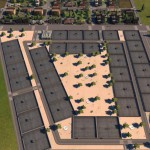 After my property ASP, I ended up in an interesting conversation about zoning. I know nothing about zoning both because I am a 1L and because I am from Houston, the only city in the country (to my knowledge and pride) without zoning.
After my property ASP, I ended up in an interesting conversation about zoning. I know nothing about zoning both because I am a 1L and because I am from Houston, the only city in the country (to my knowledge and pride) without zoning.
As I listened to a few anectdotes and told a few of my own, I was reminded of the “mainland” in Second Life (r) (SL). I think of what I have been told about the reason that Houston “is the way it is,” generally meaning that there is a lot of mixing of buildings for public and private use and much city sprawl. I also begin to think of the mainland on Second Life (R). A chaotic place to say the least.
In an effort to better understand the basics of zoning, I looked it up in the dictionary and on Wikipedia. Here is a bit of what I’ve found.
Webster’s says that zoning is “to partition (a city, borough, or township) by ordinance into sections reserved for different purposes (as residence or business).” Wikipedia shows a more detailed, conflicted, and legally interesting view. After starting with a general overview of zoning in the USA, in which it states that zoning is the segregation of incompatible land uses, Wikipedia specifically states that Houstonians have three times struck down zoning in the city. It further defends Houston, stating that many sunbelt cities have similar sprawl, which occured prior to the introduction of zoning. The article then went on to discuss law and a few notable cases, including Euclid v. Ambler Realty Co., the first (I think) and last facial challenge to zoning as a whole as unconstitutional.
I have a conflicted view of zoning myself. I don’t see the sprawling city that I grew up in as a bad one, but its large size and highly mixed neighborhoods contribute to the increased use of personal vehicles and horizontal, rather than vertical, building habits. I see these things as part of the reason why Houston had to fight in the last few years to lose its title as the fattest city in the country, a title gained (pun intended) in 2005. I also feel that the relatively free use of the land better mimics the townships common in countries throughout history. Everything can and must be compatible. I think it gives homeowners more reason to be interested in the businesses in the area. If an adult book store and a factory can have the right to build up on opposite ends of your neighborhood, you will be much more likely to care about the business practices of both companies.
Also, I see zoning from the perspective of Second Life(r) (SL), which, like Houston, has no zoning. Many an avatar on SL bemoans the lack of sim planning by Linden Labs(c). The complaints are similar to those about Houston. There is a lot of mixing of buildings for public and private use, and the whole mainland seems to suffer from confused sprawl, but even more worriesome on SL is that the lack of restriction allows people to terraform the land as they wish – meaning that a mountain, a lake, and a plain may all be next to each other with no transition. Buildings in SL range from those that mimic real buildings to science fiction creations and nature recreations; they can be placed at any altitude and can emit light, sound, particles, and sometimes objects, at will. The land and buildings can interact with you. For example, if you wander off of the edge of the parcel where you are visiting a friend’s home, you may receive a welcome notice from the club next door and an invite to join the group that it owns, or you may get teleported to your home for trespassing on someone’s private property.The only unifying theme on the SL mainland is the road(s). The roads on the mainland start nowhere and lead to nowhere. They have no intersections and generally no traffic.
Whereas many of SL’s “islands” (sims owned by private parties) have covenants that restrict the usage of the land, even they are at risk of this convoluted mixing. You may walk from one parcel that is a mountainous winter scene to another that contains a tropical island chain. Here I am not conflicted about the need for zoning, although I find the disjointed buildings and land sometimes make me as frustrated as any one else. I feel that the benefits of having the freedom to build what one likes, however one like, far outweighs any frustration that stems from encountering such confusion.
I’ll leave “why” I feel this way a cliff hanger, and invite all of you to my brand new blog, Life and Avatar Law. I have found that I like writing about SL from the perspective of a student of the law, and I hope that as my studies go on, my examination of the legal aspect of virtual living not only becomes more expert but also stimulates others to think of legal issues in the virtual world with more seriousness.
Thanks again to those who gave me this opportunity. I am very grateful for it and have learned a lot.
